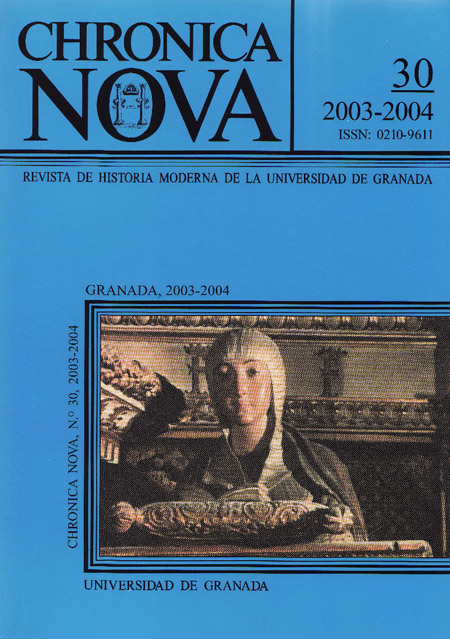The extended history of confinement to relieve poverty. The Hospicio general de pobres de Granada, 1753-1786
DOI:
https://doi.org/10.30827/cn.v0i30.1902Keywords:
Charity and Bourbon Reformism, Poor relief, ConfinementAbstract
As a result of Fernando VI foundation of Hospicio general de pobres de Granada one can study the causes and consequences of confinement. The segregation of the poor due to begging and charity was a means to making profitable the relief. Although this was in conflict with the existing catholic paradigm, in practice the catholic approach to relieve persisted both in terms of the local administrative behaviour as well as the people’s cultural valúes. However, the monarch ignored this local environment in the drafting of the Royal Decree of Hospicio. Consequently, this determined the specific adaptation of the Enlightenment program. In addition this prevented the expected change of attitude of the poor regarding the provisión of help. Few years later, a new Decree by Carlos III again set the legal foundation of the Hospicio in Granada. This clearly shows the failure of Fernando VI program. This illustrates how the causes of poverty had not been taken into account in the shaping of the confinement legislation by the powers. This also indicates how the program overlooked the human aspect of the poor whom were considered only as a social commodity, reflecting the prejudiced perception of those in power. In fact, the architectonic shape of the building reinforced the legal frame to the extent of moulding the lives of the residents, maintaining physical segregation of women and young girls, and men and young boys.Downloads
Downloads
Published
How to Cite
Issue
Section
License
Nuestra revista se atiene a las recomendaciones para la implementación del Artículo 37 Difusión en Acceso Abierto de la Ley de la Ciencia, la Tecnología y la Innovación:
- Los/as autores/as cuyas contribuciones sean aceptadas para su publicación en esta revista conservarán el derecho no exclusivo de utilizar sus contribuciones con fines académicos, de investigación y educativos, incluyendo el auto-archivo o depósito de los artículos aceptados en repositorios institucionales o temáticos de acceso abierto de cualquier tipo en un plazo máximo de seis meses.
- Preferiblemente se permitirá el uso de la versión publicada de las contribuciones científicas, que estarán accesibles en abierto tan pronto como sea posible.
-
Que en caso de que el trabajo sea aprobado para su publicación, el/la autor/a autoriza de manera ilimitada en el tiempo a la entidad editora para que incluya dicho texto en Chronica Nova y pueda reproducirlo, editarlo, distribuirlo, exhibirlo y comunicarlo en el país y en el extranjero por medios impresos, electrónicos, CD, Internet o cualquier otro medio conocido o por conocer.






 ISSN-e: 2445-1908
ISSN-e: 2445-1908










